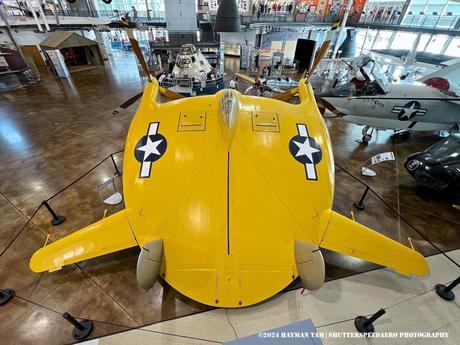
@ Dallas, TX
May 2024
Spotted this one-of-a-kind aircraft on my first visit to the Frontiers of Flight Museum in Dallas. Nicknamed the Flying Pancake, Vought designer Charles Zimmerman reasoned that drag created by tip vortices of conventional wings would be minimized by placing the propeller at the wing tip. With two large propellers providing uniform airflow over the entire span, he felt that this design could take off and land at exceptionally low speeds and still have good high-speed performance. The V-173 also had a complex empennage consisting of two horizontal stabilizers and elevators, two rudders, and two large elevators at the rear of the circular wing. Charles Lindbergh piloted the V-173 during the test program and found it surprisingly easy to handle and exhibited impressive low-speed capabilities. The V-173 could take off in 200 feet and could take off vertically with a 25-knot headwind. First flown in November 1942, the Flying Pancake was retired in March 1947. The Navy was so impressed with the flight test results that they ordered the construction of the Vought XF5U-1 utilizing a similar configuration. That project never flew, cancelled in favor of jet-powered aircraft performance. Restoration of the Flying Pancake took place over eight years, with Vought Aircraft Heritage Foundation volunteers donating over 25,000 labor hours to complete this effort.
